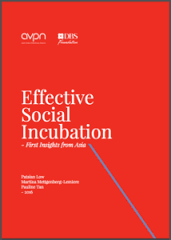
Find full repor here:
http://avpn.asia/wp-content/uploads/2016/05/AVPN_IncubatorStudy_WEB.pdf
Find here the executive summary:
Data for sustainability after 2 years and beyond is, however, not available and so it is not possible to state how far the sustainability achieved should be credited to the incubators.
We added another parameter: how far SPOs are progressing in social incubators from their status at the entry point to that when they leave. In terms of progression towards scale, we followed the four stages of Idea Stage, Prototype Stage, Post-Revenue Stage and Growth Stage introduced by ANDE-Villcap in 2013 and classified organisations at entry and at exit according to these stages. In our sample seven out of the ten incubators progressed one to three stages, while another three incubators indicated no change in progression. Hence it appears that social incubators facilitate the progression of SPOs towards scale.
Given their effectiveness in allowing SPOs progress, we looked into how they operate and a number of operating dependencies at the incubator level. Social incubators tend to rely on grant finding and are
not generating sufficient revenue to be sustainable through equity or programme fees. As mentioned above, selectiveness is 22.4% on average in our sample of incubators. This helps the incubator in
planning its resources and ensuring high-quality delivery. In terms of selection criteria, three ranked highest and showed how social incubators differentiate themselves from mainstream incubators:
- Ambition for social impact
- Commitment to meet an unmet social need
- Potential to benefit from incubation
Another critical ingredient for incubator’s effectiveness is the extent of its networks. Strong, diverse and local or regional networks were the most useful networks for incubators as they allowed incubators to provide their incubatees with contacts. The top three partners of social incubators in our sample were local universities, regional/Asian corporates and local foundations. The expected outcomes of networks and partnerships were the sharing of skills and expertise, the potential for
future collaboration, and increased and follow-on funding for graduates.
Regarding the programme and services provided, the intensity, length and content is critical for the success of the incubatees. In our sample, almost 50% of our incubators had programmes longer than 12 months. 30% of these longer programmes supported SPOs in the prototype stage. The intensity
of support for our incubators ranges from 4 to 18.3 hours a month. By comparison, top commercial incubators in the US appear to spend 20 hours a month with their incubatees.In terms of service and programme delivery, half of the social incubators in our sample provide both structured and customised programmes and the other half are almost equally split between structured-only and customised-only programmes. As the needs of incubatees are diverse, these different programmes address needs at different stages.
More importantly, in terms of content of provided programmes, our sample revealed a bias for business skills by providing ‘networking activities’, ‘business planning’ and ‘training to develop business skills’ most frequently.By contrast, impact measurement support is one of the least provided services (ranking ninth out
of 12). The services provided are in line with commercial incubators. Yet, the lack of provisions for impact measurement support stand out because the initial selection criteria for social incubators are ‘ambition for social impact’ and ‘commitment to meet an unmet social need’.In our sample, the balance between time-bound and performance-based graduation was almost equal. Follow-on support for graduates often seems to continue loosely in the form of mentorship, access to information and networking support. We also found a number of solutions to balance the scarce resources of social incubators with the need of graduates for continued support and hence sustainability.
Services were delivered by full-time staff and mentors in the social incubators. Each social incubator in our sample had on average 13 staff members and 24 mentors (after controlling for outliers). Critically, diversity, commitment and expertise were needed by mentors to support incubatees.
Finally, at the end of the report, the portraits of the 15 incubators are presented with key statistics. Methodologically, the study is based on surveys and interviews with 15 incubators. The analysis focuses on conservative descriptive statistics. The analysis was both inspired and continuously contrasted with available literature on commercial as well as social incubation in other geographies. Taken together, the insights into the incubators’ operating dependencies, programmes and human capital provide a first look at Asia’s social incubation practices.










Add new comment